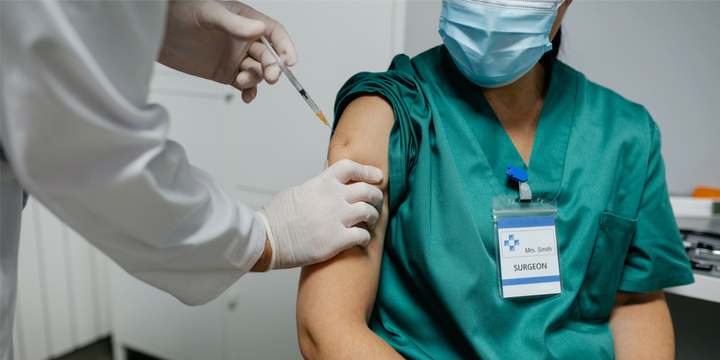“I was off work for five weeks, and I only partially recovered taste and smell,” explains François. This 44-year-old stretcher bearer contracted the Covid in April 2020, at the CHBA in Vanne, in Morbihan. For him, the contamination could only have taken place at his workplace: “I was only working and I was using the drive to do my shopping,” he explains.
Since the start of the epidemic, Public Health France has noted 44,401 cases of nosocomial Covid, that is to say contracted in hospital. Among these cases, there are caregivers, but also patients. To counter this phenomenon, many voices are calling for the vaccination of caregivers.
Rant! …. father of a colleague who had managed to avoid the Covid, died between the 1st and the 2nd injection of Pfizer vaccine, most likely contaminated by a caregiver during a biopsy in a clinic. ALL PATIENT CONTACT CAREGIVERS MUST BE VACCINATED!
– Fontanieu ???????? (@Fontanieu) February 25, 2021
Contamination in healthcare establishments
“Patients come to the hospital without carrying the virus, and during their stay they contract the disease. These nosocomial Covids have been around for a year, which is nothing new. But now, we have vaccines available to staff, ”urges Professor François Chast, former head of the clinical pharmacy department at the Necker Hospital in Paris.
Professor Chast explains that vaccinating caregivers would prevent them from getting sick, but also from transmitting the disease to the patients they care for. The solution: “We must generalize the vaccination obligation among caregivers. “
To read also: Anti-covid vaccines: what effectiveness?
Make vaccination compulsory
All caregivers already have the obligation to be vaccinated against five diseases: diphtheria, tetanus, polio and hepatitis B. “These vaccinations are not to be neglected”, tempers Professor Chast. “But there has been no case of diphtheria other than imported in the past 20 years. There has not been a case of polio in France for 32 years, and the vaccine remains compulsory! “
Compared to Covid, these diseases appear to be less of a priority. “By the end of March, the Covid will have killed 100,000 people in one year, and infected around 4 million people,” he recalls. “The numbers have nothing to do with it. In addition, if the caregivers catch it, it will take them away from hospital life for a few days or weeks, and it is not negligible. “
Mistrust of caregivers
Despite these calls, only a quarter of AstraZeneca vaccines intended for caregivers were used in a month, according to the general directorate of health. François understands this mistrust: at 44, this caregiver is now one of the priority people for vaccination. “I refuse the AstraZeneca vaccine that is imposed on caregivers. Be careful, I am not anti-vaccine, quite the contrary, but I want to have the choice of the laboratory.”
According to François, an injection of the Pfizer or Moderna vaccine would seem safer. Several of his acquaintances vaccinated with AstraZeneca have observed significant side effects: “Severe fatigue, abnormally high fever, for some causing inability to work. Some even hesitate to give the second injection.”
For François, it is a certainty: “If we had the choice of the vaccine, there would be more caregivers vaccinated to date.” According to Prof Chast, the AstraZeneca vaccine is just as safe as the others. An argument that has difficulty convincing caregivers.
A duty to set an example
What the former head of department regrets most is the influence that reluctant caregivers can have on public opinion. “You can’t prevent a doctor from being diabetic. But we can imagine that a doctor is not a smoker. How else can he invite one of his patients to quit smoking? Likewise, if a doctor does not want to be vaccinated, how do you want him to encourage his own patients? There is a collective responsibility of caregivers. They must have an exemplary attitude. “
For the former head of department, strong support from hospital staff would reassure the population. “In the EHPAD, the people accommodated are vaccinated at 80%, but the personnel are only vaccinated at 30 to 40%. It’s not good. However, there has been a lot of debate about the loneliness of the elderly last year. If everyone was vaccinated, we could live as before in nursing homes. But that is not possible today. “
François Chast recalls that “vaccination not only protects those who are vaccinated, but also creates a barrier effect in the contamination from one person to another. There is no shortage of vaccines, there is a lack of volunteers to be vaccinated. “
 Cherry tomatoes contaminated with salmonella: 92 sick and 1 dead
Cherry tomatoes contaminated with salmonella: 92 sick and 1 dead  A better coaching method can make a person grow
A better coaching method can make a person grow  What is the method to prevent diabetes in children?
What is the method to prevent diabetes in children?  What are the effective factors in causing stomach ulcers?
What are the effective factors in causing stomach ulcers?  Why do embarrassing memories seem to appear at night?
Why do embarrassing memories seem to appear at night?  The amazing link between SARS-CoV-2 infection and newly started diabetes
The amazing link between SARS-CoV-2 infection and newly started diabetes  WHO says monkey pox is not a global emergency right now
WHO says monkey pox is not a global emergency right now  Single cell RNA sequencing uncovers new mechanisms of heart disease
Single cell RNA sequencing uncovers new mechanisms of heart disease  Hepatitis of unknown origin: 3 new deaths and 228 cases worldwide
Hepatitis of unknown origin: 3 new deaths and 228 cases worldwide 